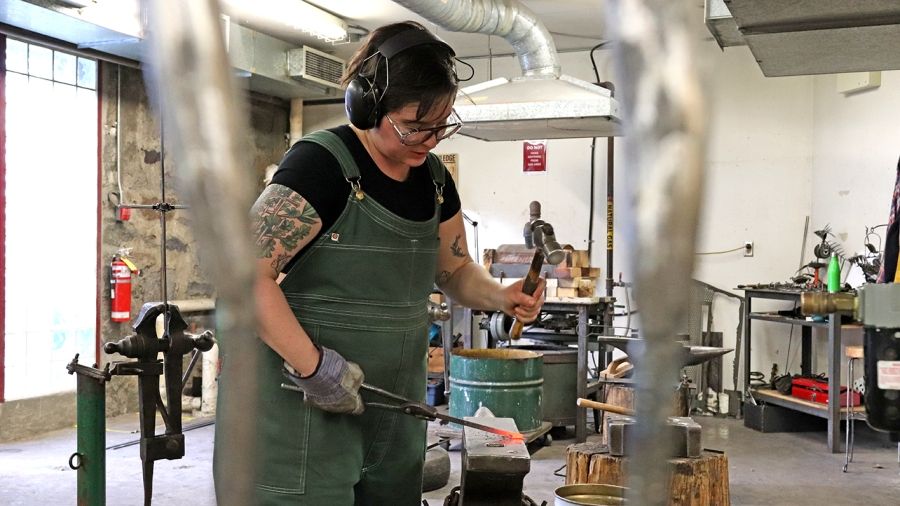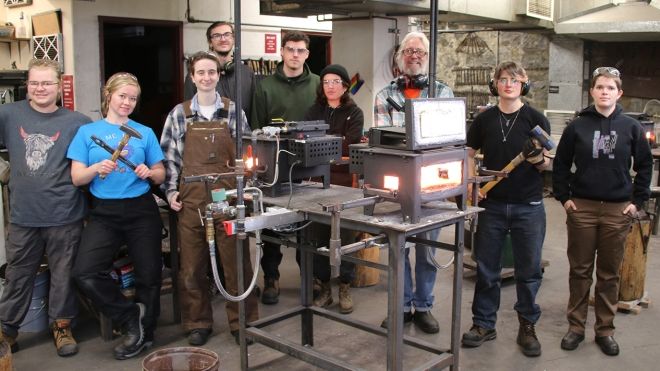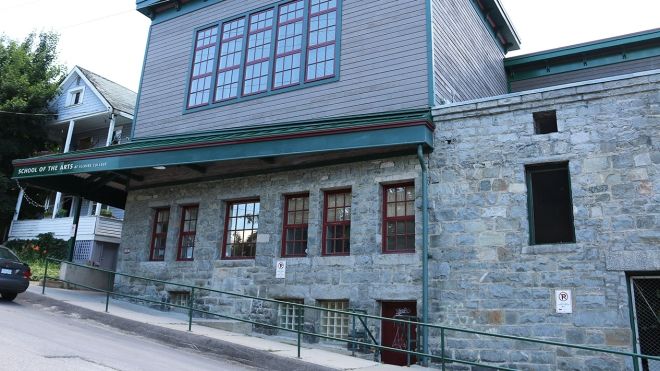Blacksmithing and Metal Art - Certificate
Overview
The ancient art of blacksmithing is alive and thriving. Enthusiastic and dedicated instructors share their passion and skills with you in the metal studio. With an emphasis on developing proper techniques and hands-on studio practice, you will learn how to bring your ideas from design to completion.
Learn how to conceptualize, draw and produce objects in steel. Discussions in the classroom, demonstrations in the studio, field trips and guest artists all contribute to your learning experience. You’ll get the opportunity to propose, plan, model and iterate your ideas with time for critique and problem-solving.
Develop the skills of a blacksmith using time-honoured techniques to craft your own tools and objects. In the second semester, you will advance to bladesmithing skills, pattern welded steel, advanced tool making and portfolio projects. A year-end show and sale will showcase your newly honed talents.
You will be immersed in a vibrant and rewarding creative experience at the Victoria Street Campus where students are also pursuing the crafts of Ceramics and Textiles.
News
Program Outcomes
Upon successful completion of this program, students will be able to:
- Use foundational skills, tools and time-honoured techniques in metal arts
- Communicate design ideas verbally and visually within an industrial and arts context
- Implement the creative design process through critical design thinking, experimentation, iteration and critique
- Demonstrate fundamental knowledge of marketing and entrepreneurship
- Construct a portfolio of creative works for future employment, education or apprenticeship
- Follow health and safety guidelines for the use of equipment, tools, materials and processes in a studio or shop environment
Admission Requirements
In addition to meeting the general entrance requirements for admission to Selkirk College, an applicant must meet the following Blacksmithing and Metal Art Program entrance requirements:
- English 12, or equivalent, with a minimum of 60%.
- Students whose first language is not English must fulfill the college’s English language proficiency requirement. See Policy 8611: Admissions.
- Submit a completed admission application form and other required documents (i.e., secondary school and any post-secondary transcripts) to the Admissions Office.
- Questionnaire
All applicants must complete and submit a questionnaire at least one week prior to their scheduled interview date. The questionnaire helps us to understand the applicant’s interest and commitment to the studio program.
Submit the questionnaire using the Kootenay Studio Arts (KSA) online form.
- Interview
All applicants are required to participate in an interview with a program instructor from KSA. Telephone interviews will be arranged for those applicants who, because of distance, cannot attend in person.
The interview is an opportunity for applicants to introduce themselves, present their work and discuss their interests within the arts. The instructor will assess the applicant’s preparedness for entry into the program and will ask about commitment, goals and expectations, design knowledge, experience and communication skills. It is also an opportunity for applicants to ask any questions they might have about the program and for faculty to recommend upgrading if necessary.
- Portfolio
The portfolio is designed to assess your skill level to help instructors increase your chances of success in your studio program. KSA is looking for a demonstration of visual awareness, creativity and technical skill. The portfolio pieces may be of any medium and they need not be specific to studio preference.
For portfolio guidelines, see our website.
APPLICATION PROCESS
1. Before an applicant's file is considered to be complete the following must have been received or marked complete by the admissions office:
a) Completed application form.
b) Official transcripts of high school grades and interim statement of grades is acceptable if applicant is currently a high school student.
c) Official transcripts of all post-secondary education grades.
d) Applicant information questionnaire.
e) Portfolio submission.
f) Interview.
2. Students wishing to enroll in the Blacksmithing Program on a part-time basis may do so providing the same entry requirements as full-time students, as stated in Part A, have been met. Part-time students are accepted only if space is available after all full-time students are scheduled, and only with permission of the School Chair.
A. PROMOTION
1. Admission to a given semester requires completion of all required courses with a minimum cumulative G.P.A. of 2.00 and no more than one (1) failure grade in the previous semester courses. Any student with more than one (1) failure must have the School Chair's approval to progress to the next semester. Students receiving a final grade of "F" in a prerequisite course will not be allowed to register in a subsequent course requiring that prerequisite.
2. To be qualified for admission into a course which stipulates a prerequisite, a minimum grade of "C" must be achieved in the prerequisite course, unless otherwise specified.
B. GRADUATION
In order to qualify for a Selkirk College Blacksmithing Certificate, a student must complete all of the following courses with a minimum Final Grade of “P” in each course and an overall GPA of 2.00 or better. see Policy 8617: Graduation
Courses
BKMA121 - Metal Studio Safety and Devices
BKMA 121 Metal Studio: Safety and Devices will teach students all aspects of studio safety. Students will learn safe behavior expectations and safe operating practices. Students will be given an overview of the Blacksmithing and Metal Art program and will develop the skills necessary to proceed into BKMA 123 Fabrication Techniques: Welded Forms.
BKMA125 - Blacksmithing Foundations
BKMA 125 Blacksmithing Foundations will develop students’ ability to manipulate hot steel with hammer and anvil, with an emphasis on hammer control and safe tool use. Students will apply a variety of basic blacksmithing techniques in the completion of simple projects.
BKMA127 - Primary Toolmaking
BKMA 127 Primary Toolmaking will teach students more advanced blacksmithing skills and techniques. Students will develop their ability to conceptualize and problem solve in an iterative design process. Students will make their own chisels and punches. Students will learn safe operation of the power hammer.
PPD101 - Drawing as a Basic Visual Communication
PPD 101 Drawing as a Basic Visual Communication. This is a basic drawing course designed to give students a background and experience in the fundamentals of drawing as a basic visual communication. Through exercises and assignments, the student will learn to use drawings as a tool to record a concept, manipulate, develop, communicate and refine those concepts.
BKMA132 - Basic Bladesmithing Skills
In BKMA 132 Basic Bladesmithing Skills, students learn and practice basic blade forging techniques. Students will actively engage in the design, production, and finishing of a rudimentary steel knife. By the end of the course students will be familiar with the techniques required to complete a simple shop knife.
BKMA134 - Pattern Welded Steel
In BKMA 134 Pattern Welded Steel, students learn and practice the ancient art of Damascus steel commonly known as pattern welded steel. The process includes learning about the characteristics of different steel types and hand forging. Students will form the pattern welded steel into a billet by forge welding, drawing out, twisting, annealing, and etching. The finished billet can be further developed in BKMA 138 Artisan Portfolio Project.
BKMA136 - Advanced Tool Making
In BKMA 136 Advanced Tool Making, students combine their blacksmithing skills. Building on the foundation of blacksmithing fundamentals, students will develop their ability to conceptualize and create advanced forms. Tool making and creative problem solving are utilized while students create their own hammer and tongs. Other tools may be assigned at the instructor's discretion.
BKMA138 - Artisan Portfolio Project
In BKMA 138 Artisan Portfolio Project, students integrate techniques, materials, skills, and objects developed in previous courses to produce a base body of work. Students begin to identify their unique artist voice in the blacksmith studio. Design iteration based on critique from others is implemented. The project requires permission from the instructor and may be individual or collaborative.
PPD111 - Professional Practice and Design
PPD 111 Professional Practice and Design provides information to assist the emerging craftsperson, designer, and maker in developing skills for selling their work in a commercial context. A variety of approaches will cover three broad areas of study: management, business, and marketing.
Tuition & Fees
Domestic
International
All amounts are estimates and are subject to change. Tuition amounts are based on a full-time course load. Please note that many programs have additional costs beyond those listed here. For more information, please visit Tuition & Fees.
Policy
Effective Term:
FallAdvanced Standing:
See policy 8614
.
Re-Entry Instructions:
Any student who has left the program, must seek approval from the School Chair for re-entry. See Policy 8615: Standards of Academic Progress.
.
Assessment:
Grading will be based on the grades specified in the Standard Academic and Career Grading Table. To view the grading tables, see Policy 8612: Grading.
.
Grading Table:
Standard Academic and Career Programs
Program Specific Regulations:
STUDIO EQUIPMENT
A. Students will be required to complete all mandatory safety training prior to using college supplied equipment and facilities. Students must wear suitable personal protective equipment (PPE) in all designated areas.
B. Studios and the equipment in them used by students in Blacksmith program are a vital part of program delivery. These rooms and all equipment must be used and maintained to high standards for the programs to operate effectively. To ensure this the following methods must be employed:
1. Return signed out equipment promptly.
2. Adhere to correct equipment usage to prevent damage.
3. Inform faculty or staff when a piece of equipment is damaged, is not operating properly, or becomes unsafe to use.
4. Keep the studio clean.
.
Attendance:
1. Attendance at all scheduled lectures, examinations, projects, activities and other learning experiences is mandatory unless the student is given written instructions to the contrary.
2. Absences from studio periods may result in lost marks since studio work is a major source of evaluation and normally cannot be repeated.
3. Absence from learning experiences, for any reason, may preclude the student being able to meet the required outcomes for that course.
4. Students absent from either two studio and/or four lectures, without prior and/or confirmed acceptable excuse may be required to withdraw from the course or program, upon the recommendation of the School Chair.
5. Students claiming illness or compassionate reasons for absence from any learning experience must contact the instructor concerned directly.
6. Students may be required to supply a professional certificate to substantiate claims of illness, injury or compassionate needs.
7. Students absent from any course, for any reason, are responsible for the work missed, and must make up missed assignments.
8. Students are required to inform the instructor in writing of planned absences prior to an evaluation event taking place and must have the written permission of the instructor to be absent. Failing this, no “make-up” will be permitted.
.
Professional Requirements:
1. Physical Health and Safety
- Students are required follow the safety directions of Selkirk College faculty and staff. Additionally, students must wear prescribed personal protective equipment (PPE) in all designated areas. Failure to follow either of these guidelines may result in the suspension of studio access privileges. Only the School Chair may reinstate studio access privileges.
- Students will be provided with information about safety issues and safety guidelines. Students are encouraged to inform the School Chair of any health (physical and/or mental) conditions (e.g., anxiety, diabetes, epilepsy, allergies), or prescription medications, which could lead to problems in isolated or studio situations. This information is for safety reasons only and will be kept confidential. Students should also inform the School Chair of any physical problems that may create difficulties for them in the program. Students who are unsafe or impact the safe environment for others will be required to leave the class until required remediation has been met.
- When participating in program field trips or other off-campus, college-related activities, students are required to comply with the health and safety and safety guidelines of both Selkirk College and those of their hosts. See College Policy 8350: Educational Field Trips.
2. Working Alone and in Isolation
- In the evenings and on weekends, students are not permitted to work alone or in isolation. At least two students must be working in a studio at any time. It is the student’s responsibility to meet this requirement. Students are required to sign in and out of studios.
- Guests and visitors of students are not permitted in the studios without prior, written approval of the School Chair. A guest or visitor is not considered to be a second student for purposes of working in the studio.
- Students may be employed by the college as a studio monitor or other assigned roles. See College Policy: 6410 Working Alone or in Isolation.
3. Alcohol and Drug Use in the Studio
- No alcoholic beverages, illegal drugs, or cannabis products are to be consumed on the college property during or before a college activity. If a student appears to be under the influence of drugs or alcohol in the studio or on the premises, they will be required to leave the studio and will be suspended from use of the studio and subject to disciplinary action as outlined in Policy 3400: Student Code of Conduct.
4. Electronic Devices in the Studio
- The use of personal electronic devices in the learning environment can be disruptive and unsafe. Usage and restrictions will be identified in the safety guidelines and may vary from studio to studio.
.
Other Regulations:
AFTER HOURS STUDIO ACCESS
1. After hours studio access is granted to Blacksmith students in good standing. Access hours will be published prior to the start of the Fall and Winter semesters. Access hours are subject to change.
2. After hours studio access can be revoked when a violation of the Student Code of Conduct has been identified. Only the School Chair or Dean may reinstate a student’s access. See College Policy 3400: Student Code of Conduct.
A. PROBATION
See College Policy 8619: Student Probation.
B. REQUIRED EXCLUSION/DISMISSAL
An instructor may recommend to the School Chair that a student be withdrawn from a course if that student has missed instructional times or failed to complete assigned work to such a degree that they could not compensate sufficiently to pass the course in the time available, or if the student has compromised the safety of others, has been destructive to property, or has disrupted the learning opportunities of others.
C. ACADEMIC INTEGRITY
See College Policy 8610: Cheating and Plagiarism.
D. APPEALS
See College Policy 8400: Student Appeals.
.
Find Out More
We look forward to connecting with you! Fill out this form and we'll reach out to you.



